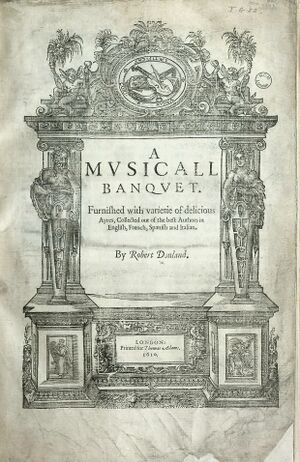Difference between revisions of "In darkness let me dwell"
| (6 intermediate revisions by the same user not shown) | |||
| Line 2: | Line 2: | ||
<!-- if it is not a solitary work, here comes the infobox from the work containing it. E. g., not “Casta Diva” but “Norma”--> | <!-- if it is not a solitary work, here comes the infobox from the work containing it. E. g., not “Casta Diva” but “Norma”--> | ||
{{Infobox musical composition | {{Infobox musical composition | ||
| name = | | name = A Musicall Banquet<!-- use |list_title= if list --> | ||
| subtitle = | | subtitle = | ||
| type = | | type = | ||
| Line 58: | Line 58: | ||
}} | }} | ||
'''"In darkness let me dwell"''' (Original: "In darknesse let mee dwell") is a song by [[John Dowland]] and appears in the collection of songs compiled by his son Robert Dowland, called [[A Musicall Banquet]], first published in 1610.<ref name="Wiki"/><p> | '''"In darkness let me dwell"''' (Original: "In darknesse let mee dwell") is a song by [[John Dowland]] and appears in the collection of songs compiled by his son Robert Dowland, called ''[[A Musicall Banquet]],'' first published in 1610.<ref name="Wiki"/><p> | ||
"In darkness let me dwell" appears on the following album: | "In darkness let me dwell" appears on the following album: | ||
| Line 68: | Line 68: | ||
|- | |- | ||
| 2021 | | [[2021]] | ||
| [[À sa guitare (Album)]] | | [[À sa guitare (Album)]] | ||
| [[Thibaut Garcia]] | | [[Thibaut Garcia]] | ||
| Line 78: | Line 78: | ||
<!-- Place <div class="wrapperlibretti"> on top of the libretto and close it in the end.--> | <!-- Place <div class="wrapperlibretti"> on top of the libretto and close it in the end.--> | ||
<!-- Use Template:Libretti, not custom HTML on the page.--> | <!-- Use Template:Libretti, not custom HTML on the page.--> | ||
<div class=" | <div class="seventeenth"> | ||
{{Song header <!-- use of this template automatically includes Template:Custom/songinfo.css --> | {{Song header <!-- use of this template automatically includes Template:Custom/songinfo.css --> | ||
| title = In darkness let me dwell | | title = In darkness let me dwell | ||
| Line 117: | Line 117: | ||
</div> | </div> | ||
{{Clear|left}} | {{Clear|left}} | ||
==Background== | |||
The text Dowland used is the first stanza of a poem that can be found in | The text Dowland used is the first stanza of a poem that can be found in ''Lyrics from the Song-Books of the Elizabethan Age''<ref name="Elizabethan"/>, although he altered the last line and changed "in" to "to" in the penultimate line. The poem is noted: "From ''John Coprario's Funeral Tears for the Death of the Right Honorable the Earl of Devonshire'', 1606 | ||
<div class="poem"> | <div class="poem"> | ||
<poem> | <poem> | ||
Latest revision as of 18:18, 13 October 2021
| A Musicall Banquet | |
|---|---|
| by John Dowland's son Robert Dowland | |
 Cover of A Musicall Banquet[1] | |
| Published | 1610 |
| Publisher | London: George Eastland, printed by Thomas Este, the assigne of Thomas Morley |
"In darkness let me dwell" (Original: "In darknesse let mee dwell") is a song by John Dowland and appears in the collection of songs compiled by his son Robert Dowland, called A Musicall Banquet, first published in 1610.[2]
"In darkness let me dwell" appears on the following album:
| Year | Album | With |
|---|---|---|
| 2021 | À sa guitare (Album) | Thibaut Garcia |
Libretto
from A Musicall Banquet
John Dowland (music), Anonymous (words)
In darkness let me dwell, the ground shall sorrow be, | |
Original | |
In darknesse let mee dwell, The ground shall sorrow be, | |
Background
The text Dowland used is the first stanza of a poem that can be found in Lyrics from the Song-Books of the Elizabethan Age[3], although he altered the last line and changed "in" to "to" in the penultimate line. The poem is noted: "From John Coprario's Funeral Tears for the Death of the Right Honorable the Earl of Devonshire, 1606
In darkness let me dwell, the ground shall sorrow be,
The roof despair to bar all cheerful light from me,
The walls of marble black that moistened still shall weep,
My music hellish jarring sounds to banish friendly sleep:
Thus wedded to my woes, and bedded in my tomb
O let me dying live till death doth come.
My dainties grief shall be, and tears my poisoned wine,
My sighs the air through which my panting heart shall pine,
My robes my mind shall suit exceeding blackest night,
My study shall be tragic thoughts sad fancy to delight,
Pale ghosts and frightful shades shall my acquaintance be:
O thus, my hapless joy, I haste to thee.[3]
Manuscripts and sheet music

- Dowland, Robert (1610). "A Musicall Banquet". IMSLP. Thomas Adams, London. Retrieved October 1, 2021.
- Dowland, Robert (1651). A Musicall Banquet, Set forth in three choice Varieties of MVSICK. GB-Ob, Oxford, Bodleian Library Douce HH 203 (1-3): T. H. for J. Benson and J . Playford.CS1 maint: location (link)
References
- ↑ 1.0 1.1 1.2 Dowland, Robert (1610). "A Musicall Banquet". IMSLP. Thomas Adams, London. Retrieved October 1, 2021.
- ↑ "John_Dowland". Wikipedia. Archived from the original on October 2, 2021. Retrieved October 2, 2021.
- ↑ 3.0 3.1 Lyrics from the Song-books of the Elizabethan Age. London: A. H. Bullen for John C. Nimmo. 1887. p. 53.54.